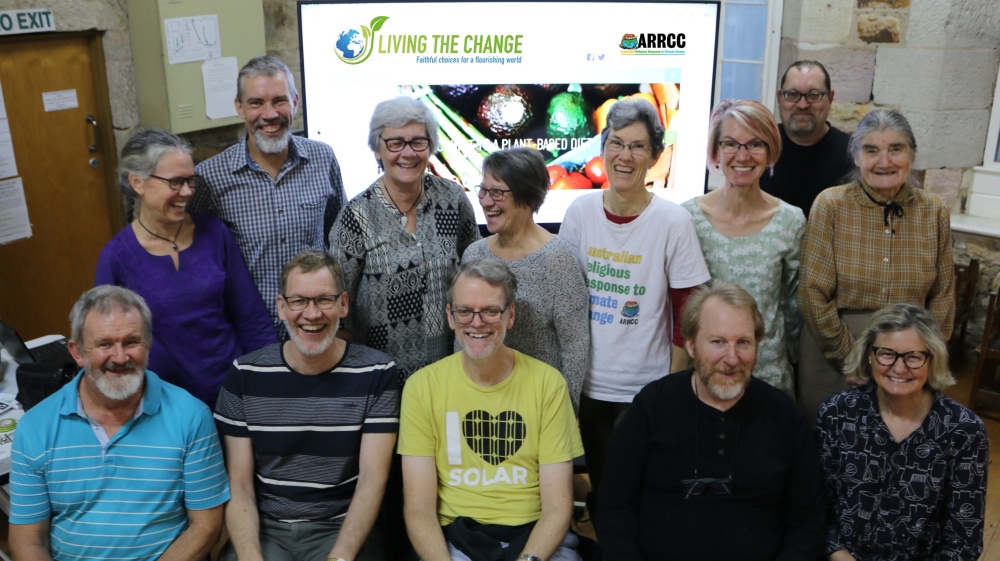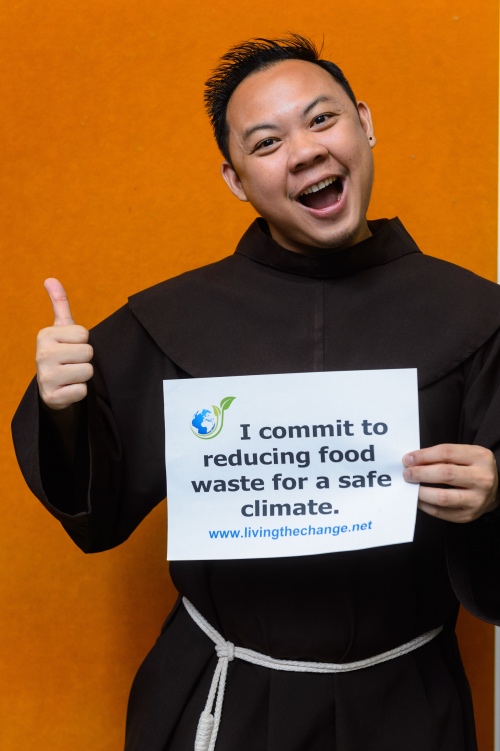
With 29th July designated Earth Overshoot Day – the annual point at which demand on Earth’s resources exceeds what the planet can regenerate in a full year, Australian Catholic theologian and author NEIL ORMEROD looks at the role Christians can play in ushering in change…
Jesus was never shy about linking the life of the disciple to suffering. We’re called to “pick up our cross” daily and follow Him (Matthew 16:24). Paul is just as direct. He reminds the Thessalonians that the sufferings they now experience are for the sake of the Kingdom (I Thessalonians 1:5). He tells his Roman congregation that by sharing in the sufferings of Christ they will share in his glory (Romans 8:17). Colossians speaks of us making up in our own bodies what is lacking in the redemptive suffering of Christ (Colossian 1:24).

Participants at a recent ‘Living the Change’ workshop in Brisbane organised by the Australian Religious Response to Climate Change. PICTURE: Peter Branjerdporn
“[C]hanges will not happen without some level of sacrifice, a redemptive suffering that will mean going without some or even many of the things we take for granted…Such choices go against the grain of many of our social norms which are built on comfort, convenience and entitlement. To that extent they come at a cost, though they also have some tangible benefits in terms of health, well-being and sense of contributing to planetary sustainability.”
Clearly, we’re not talking about just any suffering, but a redemptive form of suffering, the suffering that arises when we confront the evils of our day, laying bare their power and thus suffering the consequences. This is what Jesus did for His day. God could have redeemed us in many different ways, but in the life of Jesus He reveals His chosen path: make the evil we suffer an opportunity for good, create a new way forward not built on revenge or recrimination, but on love, repentance and forgiveness. This is a new creation, a creation out of the void of evil, far more radical than the original creation ex nihilo.
Many would say we are about to enter an era of unprecedented global suffering through the climate emergency to confronts us. It’s not difficult to identify some of the issues that will arise as our climate warms beyond its safe limits:
• Disruption of food supplies as changing weather patterns renders agricultural land less productive;
• Rising sea levels leading to forced migrations of people around the globe (for example, the exposure of Bangladesh in this regard);
• Climate disasters in droughts, floods, and cyclones leading to loss of life and destruction of civil and personal infrastructure;
• The spreads of exotic tropical diseases into new regions as previous temperate climates become tropical (malaria, Ebola, Ross River fever);
• The breakdown of social order as our political and economic systems strain to deal with all the above and other climate driven issues.
If all this were the product of some natural catastrophe, our proper response might simply be compassion for all those suffering; however, it is increasingly clear that climate change is being driven by carbon dioxide emissions from our burning of fossil fuels, goal, gas, and oil. The problem is created by our love affair with comfort (heating and cooling), with travel (private over public transport, international air travel and tourism), with consumer goods (planned obsolescence, a throw-away culture), with carbon intensive agriculture (meat production) and the like. We are overshooting the planet’s capacity to renew itself and hence to sustain us. As Pope Francis prophetically commented in his encyclical Laudat Si’: “Doomsday predictions can no longer be met with irony or disdain. We may well be leaving to coming generations debris, desolation and filth.”
This is a problem, however, where we all have a responsibility, particularly those of us in first world, high carbon emitting countries. Australia has one of the highest per capita carbon footprints in the developed world. If you add our massive coal and gas exports our carbon contribution grows significantly. Yet the ones who are paying the price for this profligacy are the poorest nations on earth. They have the least resources to protect themselves from the impacts of climate change. We are caught in an unjust economic and political system which is promoting these impacts. The question is, how can we redeem this situation? What good needs to emerge in face of this evil? How can we be midwives to the needed political and economic changes?

Br Gerald Saimel who is among those taking part in the ARRCC’s ‘Living the Change’ campaign. PICTURE: Julian Meehan
Such changes will not happen without some level of sacrifice, a redemptive suffering that will mean going without some or even many of the things we take for granted. Some religious people are making significant changes in their lifestyles: wearing an extra pullover rather than cranking up the heating; eating less meat, especially beef and lamb; using public transport or just walking where possible rather than taking a car; thinking twice about that overseas holiday with its enormous carbon footprint. These are the lifestyle changes recommended through the Living the Change campaign promoted by the Australian Religious Response to Climate Change. Such choices go against the grain of many of our social norms which are built on comfort, convenience and entitlement. To that extent they come at a cost, though they also have some tangible benefits in terms of health, well-being and sense of contributing to planetary sustainability.
Of course the great social and political reformers of our age, Mahatma Gandhi, Martin Luther King and Nelson Mandela, did not stop with lifestyle changes, so some religious believers today are stepping outside their comfort zones to engage in concerted actions, non-violent protests, sit-ins and the like, risking arrest and fines to bring the problem of climate change to public attention, to confront our politicians and business leaders with the realities they seem intent on ignoring. However, we cannot neglect our own responsibility to live simply.
As Pope Francis notes: “We must not think that these efforts are not going to change the world. They benefit society, often unbeknown to us, for they call forth a goodness which, albeit unseen, inevitably tends to spread. Furthermore, such actions can restore our sense of self-esteem; they can enable us to live more fully and to feel that life on earth is worthwhile.”
July 29th has been designated Earth Overshoot Day. It marks the time of year in 2019 when we will have used more from nature than can be renewed in the full year. Put simply we are living beyond our limits, beyond our means. We have succumbed to the temptation of the Serpent in the Garden of Eden, “You shall be like gods.” And just like Adam and Eve we will be expelled from our garden planet because of our sinful pride, leaving future generations nothing but “debris, desolation and filth.” To avert this, we must pick up our cross and learn to live with less while engaging in process of political and economic change that establish a more sustainable approach to living on a fragile planet.
Neil Ormerod is a Catholic theologian and author, and married to Thea Ormerod, president of Australian Religious Response to Climate Change. He currently works with in the Sydney College of Divinity research office.





